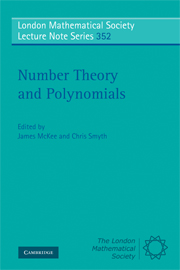Book contents
- Frontmatter
- Contents
- Preface
- Index of authors
- List of participants
- Conference photograph, with key
- The trace problem for totally positive algebraic integers
- Mahler's measure: from Number Theory to Geometry
- Explicit calculation of elliptic fibrations of K3-surfaces and their Belyi-maps
- The merit factor problem
- Barker sequences and flat polynomials
- The Hansen-Mullen primitivity conjecture: completion of proof
- An inequality for the multiplicity of the roots of a polynomial
- Newman's inequality for increasing exponential sums
- On primitive divisors of n2 + b
- Irreducibility and greatest common divisor algorithms for sparse polynomials
- Consequences of the continuity of the monic integer transfinite diameter
- Nonlinear recurrence sequences and Laurent polynomials
- Conjugate algebraic numbers on conics: a survey
- On polynomial ergodic averages and square functions
- Polynomial inequalities, Mahler's measure, and multipliers
- Integer transfinite diameter and computation of polynomials
- Smooth divisors of polynomials
- Self-inversive polynomials with all zeros on the unit circle
- The Mahler measure of algebraic numbers: a survey
The Hansen-Mullen primitivity conjecture: completion of proof
Published online by Cambridge University Press: 04 May 2010
- Frontmatter
- Contents
- Preface
- Index of authors
- List of participants
- Conference photograph, with key
- The trace problem for totally positive algebraic integers
- Mahler's measure: from Number Theory to Geometry
- Explicit calculation of elliptic fibrations of K3-surfaces and their Belyi-maps
- The merit factor problem
- Barker sequences and flat polynomials
- The Hansen-Mullen primitivity conjecture: completion of proof
- An inequality for the multiplicity of the roots of a polynomial
- Newman's inequality for increasing exponential sums
- On primitive divisors of n2 + b
- Irreducibility and greatest common divisor algorithms for sparse polynomials
- Consequences of the continuity of the monic integer transfinite diameter
- Nonlinear recurrence sequences and Laurent polynomials
- Conjugate algebraic numbers on conics: a survey
- On polynomial ergodic averages and square functions
- Polynomial inequalities, Mahler's measure, and multipliers
- Integer transfinite diameter and computation of polynomials
- Smooth divisors of polynomials
- Self-inversive polynomials with all zeros on the unit circle
- The Mahler measure of algebraic numbers: a survey
Summary
Abstract. This paper completes an efficient proof of the Hansen-Mullen Primitivity Conjecture (HMPC) when n = 5, 6, 7 or 8. The HMPC (1992) asserts that, with some (mostly obvious) exceptions, there exists a primitive polynomial of degree n over any finite field with any coefficient arbitrarily prescribed. This has recently been proved whenever n ≥ 9 or n ≤ 4. We show that there exists a primitive polynomial of any degree n ≥ 5 over any finite field with third coefficient, i.e., the coefficient of xn−3, arbitrarily prescribed. This completes the HMPC when n = 5 or 6. For n ≥ 7 we prove a stronger result, namely that the primitive polynomial may also have its constant term prescribed. This implies further cases of the HMPC and completes the HMPC when n = 7. We also show that there exists a primitive polynomial of degree n ≥ 8 over any finite field with the coefficient of xn−4 arbitrarily prescribed, and this completes the HMPC when n = 8. A feature of the method, when the cardinality of the field is 2 or 3, is that 2-adic and 3-adic analysis is required for the proofs. The article is intended to provide the reader with an overview of the general approach to the solution of the HMPC without the weight of detail involved in unravelling the situation of arbitrary degree.
Information
- Type
- Chapter
- Information
- Number Theory and Polynomials , pp. 89 - 120Publisher: Cambridge University PressPrint publication year: 2008
Accessibility standard: Unknown
Why this information is here
This section outlines the accessibility features of this content - including support for screen readers, full keyboard navigation and high-contrast display options. This may not be relevant for you.Accessibility Information
- 1
- Cited by
